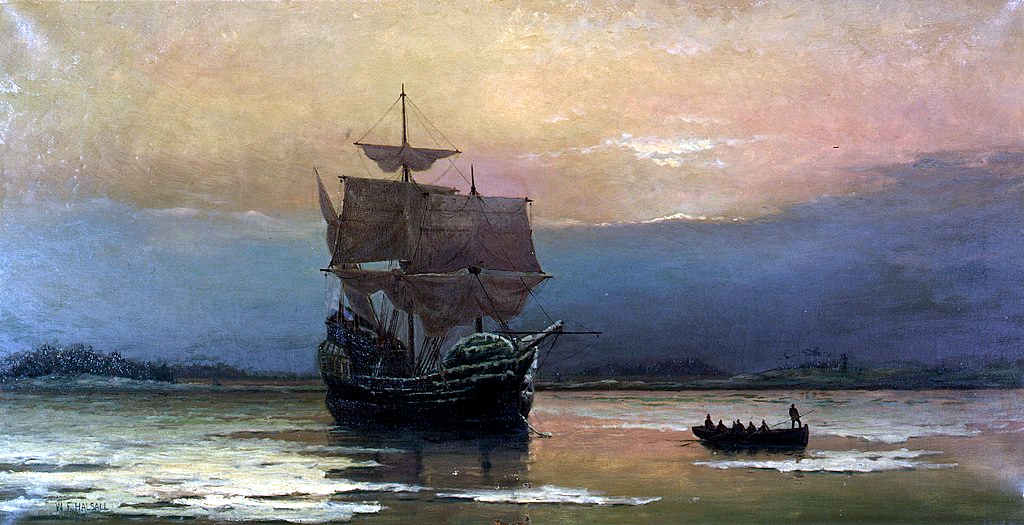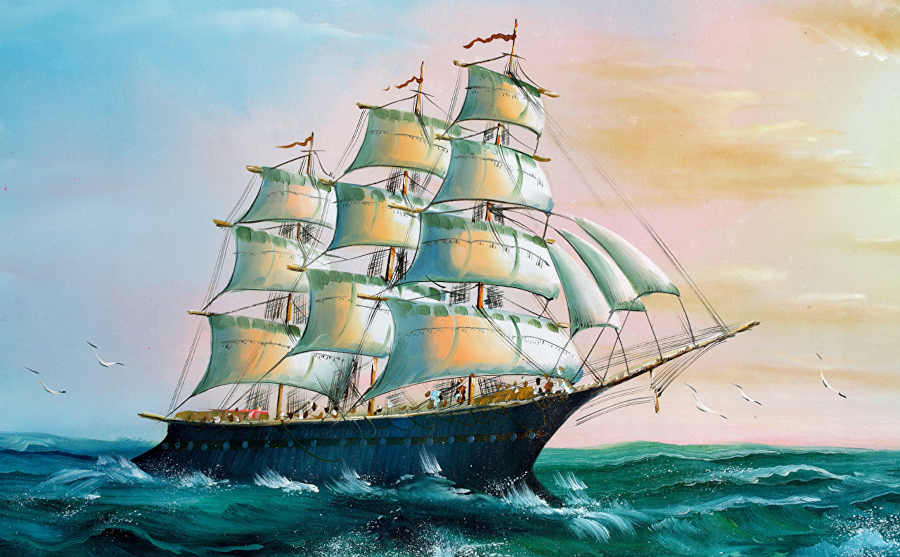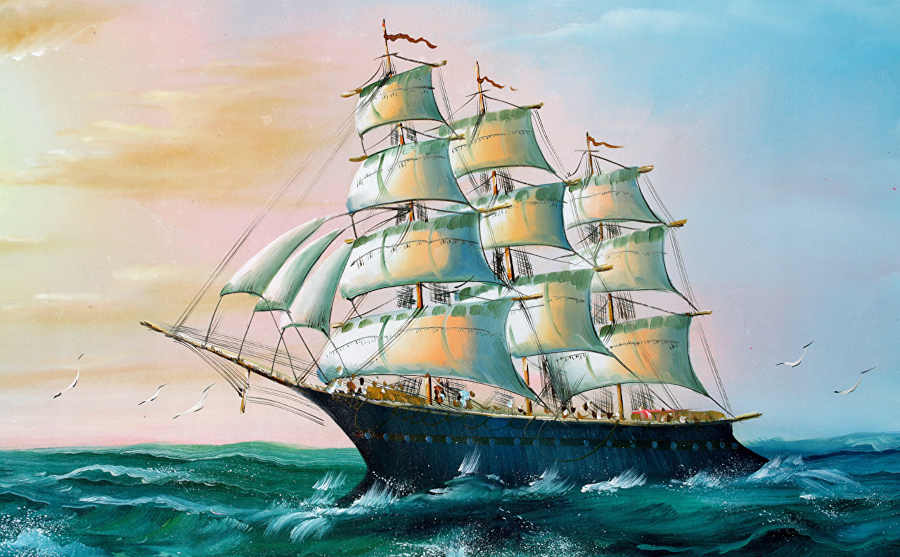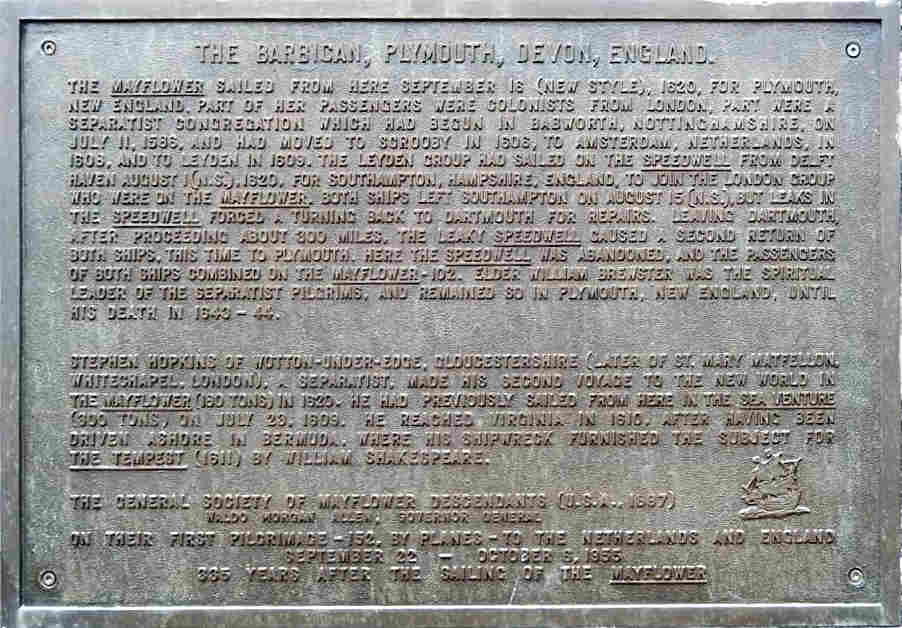 |
The Barbican, Plymouth, Devon, England The Mayflower sailed from here September 16 (New style), 1620, for Plymouth, New England. Part of her passengers were colonists from London, part were a separatist congregation which had begun in Babworth, Nottinghamshire on July 11, 1586, and had moved to Scrooby in 1606, to Amsterdam, Netherlands, in 1608, and to Leyden in 1609. The Leyden group had sailed on the Speedwell from Delft Haven August 1 (N. S.), 1620, for Southampton, Hampshire, England, to join the London group who were on the Mayflower. Both ships left Southampton on August 15 (N. S.), but leaks in the Speedwell forged a turning back to Dartmouth for repairs. Leaving Dartmouth, after proceeding about 300 Miles, the leaky Speedwell caused a second return of both ships, this time to Plymouth. Here the Speedwell was abandoned, and the passengers of both ships combined on the Mayflower - 102. Elder William Brewster was the spiritual leader of the separatist pilgrims, and remained so in Plymouth, New England, until his death in 1643 - 44.
Stephen Hopking of Wooton-Under-Edge, Gloucestershire (Later of St. Mary Matfellon, Whitechapel, London), separatist, made his second voyage to the new world in the Mayflower (160 tons) in 1620. He had previously sailed from here in the Sea Venture (300 tons) on July 23, 1609. He reached Virginia in 1616, after having been driven ashore in Bermuda, where his shipwreck furnished the subject for the Tempest (1611) by William Shakespeare.
The General Society of Mayflower Descendants (U. S. A. 1687)
Waldo Morgan Allen, Govenor General
on their first pilgramage - 152, by planes - to the Netherlands and England
September 22 - October 6, 1955
335 years after the sailing of the Mayflower. |
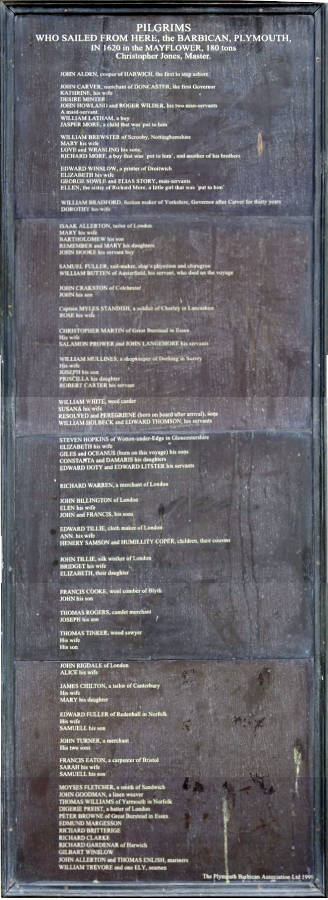
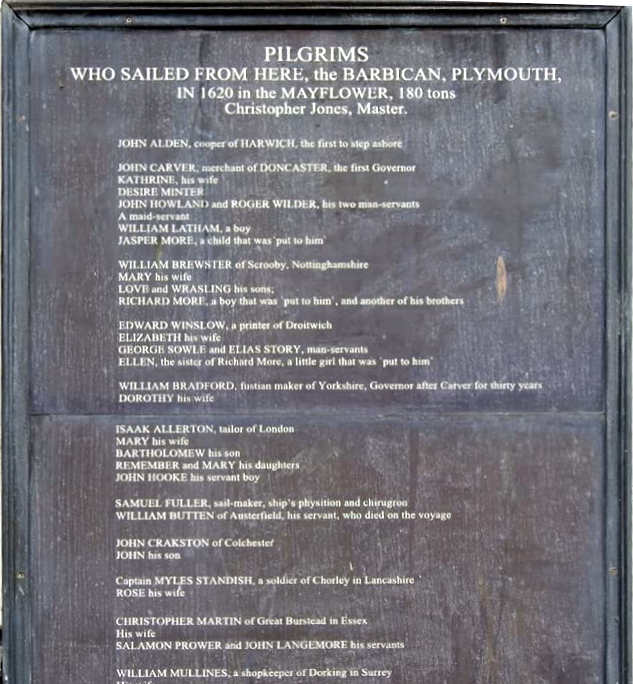
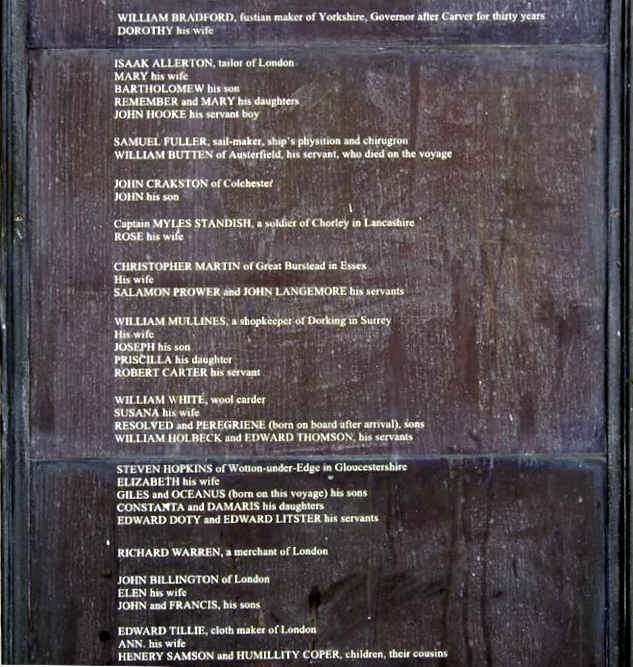
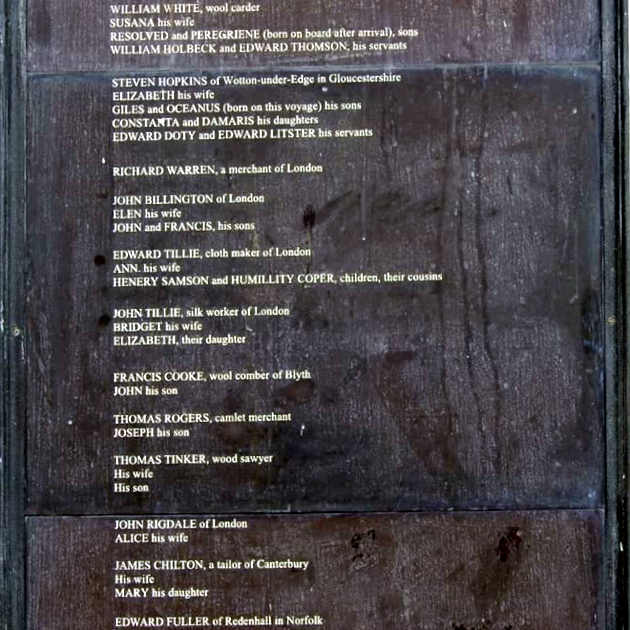
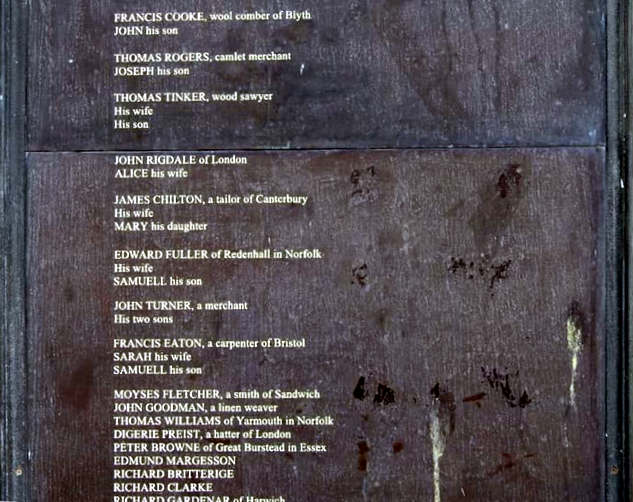
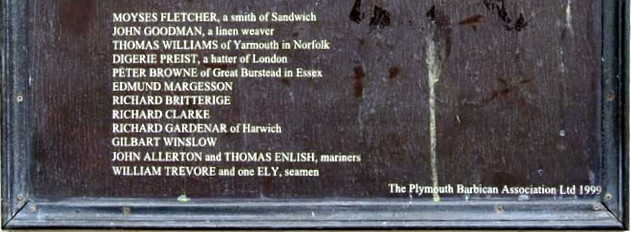
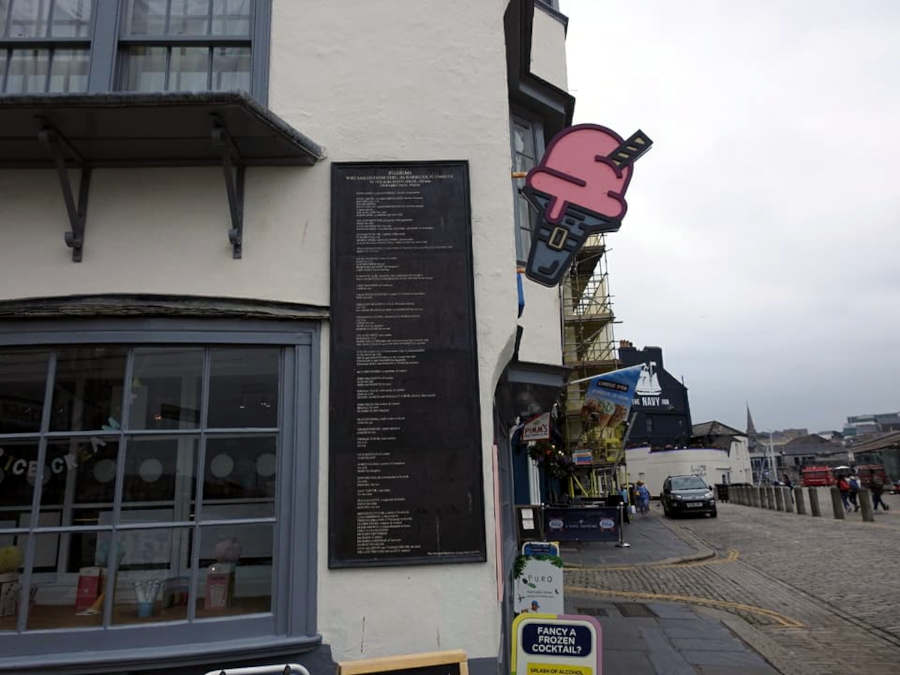
The location were the
memorial can be found.
|
Pilgrims
who sailed from here, the Barbican, Plymouth,
in 1620 in the Mayflower, 180 tons
Christopher Jones, Master |
John Alden, cooper of Harwich, the first to step ashore
John Carver, merchant of Doncaster, the first Governor
Kathrine, his wife
Desire Minter
John Howland and Roger Wilder, his two man-servants
A maid servant
William Latham, a boy
Jasper More, a child that was put to him
William Brewster of Scrooby, Nottinghamshire
Mary his wife
Love and Wrasling his sons
Richard More, a boy that was put to him, and another of his brothers
Edward Winslow, a printer of Droitwich
Elizabeth his wife
George Sowle and Elias Story, man-servants
Ellen, the sister of Richard More, a little girl that was put to him
William Bradford, fustian maker of Yorkshire, Governor after Carver for thirty years
Dorothy his wife
Isaak Allerton, tailor of London
Mary his wife
Remember and Mary his daughters
John Hooke his servant boy
Samuel Fuller, sail-maker, ship's physition and chirugron
William Butten of Austerfield, his servant, who died on the voyage
John Crakston of Colchester
John his son
Captain Myles Standish, a soldier of Chorley in Lancashire
Rose his wife
Christopher Martin of Great Burstead in Essex
His wife
William Mullines, a shopkeeper of Dorking in Surrey
His wife
Joseph his son
Priscilla his daughter
Robert Carter his servant
William White, wool carder
Susana his wife
Resolved and Peregriene (born on board after revival), sons
William Holbeck and Edward Thomson, his servants
Steven Hopkins of Wootton-under-Edge in Gloucestershire
Elizabeth his wife
Giles and Oceanus (born on this voyage) his sons
Constanta and Damaris his daughters
Edward Doty and Edward Litster his servants
Richard Warren, a merchant of London
John Billington of London
Elen his wife
John and Francis, his sons
Edward Tillie, cloth maker of London
Ann, his wife
Henry Samson and Humillity Coper, children, their cousins
John Tillie, silk worker of London
Bridget his wife
Elizabeth, their daughter
Francis Cooke, wool comber of Blyth
John his son
Thomas Rogers, camlet merchant
Joseph his son
Thomas Tinker, wood sawyer
His wife
His son
John Rigdale of London
Alice his wife
James Chilton, a tailor of Canterbury
His wife
Mary his daughter
Edward Fuller of Redenhall in Norfolk
His wife
Samuell his son
John Turner, a merchant
His two sons
Francis Eaton, a carpenter of Bristol
Sarag his wife
Samuell his son
Moyses Fletcher, a smith of Sandwich
John Goodman, a linen weaver
Thomas Williams of Yarmouth in Norfolk
Digerie Preist, a hatter of London
Peter Browne of Great Burstead in Essex
Edmund Margesson
Richard Britterige
Richard Clarke
Richard Gardenar of Harwich
Gilbart Winslow
John Allerton and Thomas Enlish, mariners
William Trevore and one Ely, seamen
The Plymouth Barbican Association Ltd 1999 |






